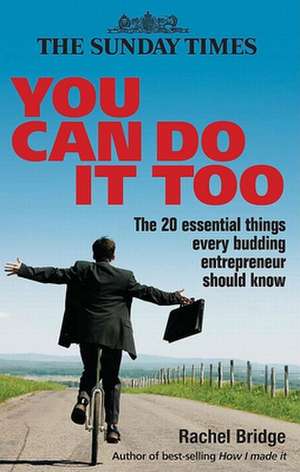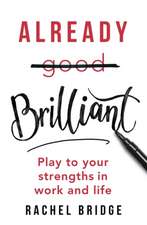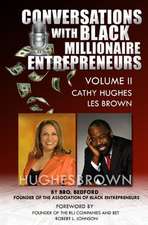You Can Do it Too
Autor Rachel Bridgeen Limba Engleză Hardback – 3 sep 2008
Starting a business is one of the most exciting and fulfilling things one can do - and it can make the entrepreneur extremely rich. Unfortunately it can also be very unpredictable, and statistically it is far more likely to end in failure than success. So how does one shift the odds in their favor? The answer is to learn from the people who have already succeeded.
You Can Do It Too brings together the collective knowledge and wisdom of successful British entrepreneurs in the form of 20 essential elements to focus on when starting a business. Each lesson in this valuable blueprint is illustrated by a real entrepreneurial story which looks at why it is important and how to incorporate it into one’s own business venture.
You Can Do It Toois the first step to a successful business and an inspirational masterclass for all budding entrepreneurs.
You Can Do It Too brings together the collective knowledge and wisdom of successful British entrepreneurs in the form of 20 essential elements to focus on when starting a business. Each lesson in this valuable blueprint is illustrated by a real entrepreneurial story which looks at why it is important and how to incorporate it into one’s own business venture.
You Can Do It Toois the first step to a successful business and an inspirational masterclass for all budding entrepreneurs.
Preț: 150.18 lei
Nou
Puncte Express: 225
Preț estimativ în valută:
28.74€ • 30.01$ • 23.73£
28.74€ • 30.01$ • 23.73£
Cartea nu se mai tipărește
Doresc să fiu notificat când acest titlu va fi disponibil:
Se trimite...
Preluare comenzi: 021 569.72.76
Specificații
ISBN-13: 9780749451530
ISBN-10: 074945153X
Pagini: 184
Ilustrații: Illustrations
Dimensiuni: 148 x 224 x 18 mm
Greutate: 0.39 kg
Editura: Kogan Page Ltd
ISBN-10: 074945153X
Pagini: 184
Ilustrații: Illustrations
Dimensiuni: 148 x 224 x 18 mm
Greutate: 0.39 kg
Editura: Kogan Page Ltd
Cuprins
Contents
Acknowledgements
Introduction
1. Find a niche
Case study: Giles Henschel, founder of Olives et Al
2. Choose a good name
Case study: Ross Lee, founder of The Barcode Warehouse
3. Be clear what you are trying to achieve
Case study: Thea Green, founder of Nails Inc
4. Get a mentor
Case study: Sanjay Bhandari, founder of Farmacia Urban Healing
5. Do proper research
Case study: Adam Pritchard, founder of Pomegreat
6. Find a business that can be scaled up
Case study: Oliver Brendon, founder of ATD Travel Services
7. Protect your idea
Case study: Laura Tenison, founder of JoJo Maman Bebe
8. Make sure the numbers add up
Case study: Loyd Hitchmough, founder of Cheshire Cookers
9. Get your timing right
Case study: Jan Smith, founder of End-o-line
10. Test your commitment
Case study: Annabel Karmel, founder of Annabel Karmel group
11. Learn to love technology
Case study: Richard Downs, founder of Iglu.com
12. Think twice before parting with equity
Case study: Justine Cather, founder of Burnt Sugar
13. Don’t expect your customers to find you -- you must find them
Case study: James Murray Wells, founder of Glasses Direct
14. Think big
Case study: Hilary Devey, founder of Pall-Ex
15. Make it easy for luck to strike
Case study: James Hibbert, founder of Dress2Kill
16. Learn how to sell
Case study: Robyn Jones, founder of Charlton House
17. Start networking
Case study: Neil Duttson, founder of Duttson Rocks
18. Build a strong team around you
Case study: Sean Phelan, founder of Multimap
19. Learn from your mistakes
Case study: David Speakman, founder of Travel Counsellors
20. Accept that it will always take longer than you think
Case study: Edward Perry, founder of Cook
Appendix: Useful websites
Acknowledgements
Introduction
1. Find a niche
Case study: Giles Henschel, founder of Olives et Al
2. Choose a good name
Case study: Ross Lee, founder of The Barcode Warehouse
3. Be clear what you are trying to achieve
Case study: Thea Green, founder of Nails Inc
4. Get a mentor
Case study: Sanjay Bhandari, founder of Farmacia Urban Healing
5. Do proper research
Case study: Adam Pritchard, founder of Pomegreat
6. Find a business that can be scaled up
Case study: Oliver Brendon, founder of ATD Travel Services
7. Protect your idea
Case study: Laura Tenison, founder of JoJo Maman Bebe
8. Make sure the numbers add up
Case study: Loyd Hitchmough, founder of Cheshire Cookers
9. Get your timing right
Case study: Jan Smith, founder of End-o-line
10. Test your commitment
Case study: Annabel Karmel, founder of Annabel Karmel group
11. Learn to love technology
Case study: Richard Downs, founder of Iglu.com
12. Think twice before parting with equity
Case study: Justine Cather, founder of Burnt Sugar
13. Don’t expect your customers to find you -- you must find them
Case study: James Murray Wells, founder of Glasses Direct
14. Think big
Case study: Hilary Devey, founder of Pall-Ex
15. Make it easy for luck to strike
Case study: James Hibbert, founder of Dress2Kill
16. Learn how to sell
Case study: Robyn Jones, founder of Charlton House
17. Start networking
Case study: Neil Duttson, founder of Duttson Rocks
18. Build a strong team around you
Case study: Sean Phelan, founder of Multimap
19. Learn from your mistakes
Case study: David Speakman, founder of Travel Counsellors
20. Accept that it will always take longer than you think
Case study: Edward Perry, founder of Cook
Appendix: Useful websites
Recenzii
"Highly recommended for those just starting out in the tough world of business." -- Midwest Book Review
Notă biografică
Rachel Bridge is the Enterprise Editor of The Sunday Times, a British newspaper. She writes the “How I Made It” column each week as well as regular features about entrepreneurs and small and growing businesses. A regular speaker on the subject of entrepreneurs, she is also the author of the best-selling How I Made It and My Big Idea, (both Kogan Page).
Descriere
You Can Do It Too brings together the collective knowledge and wisdom of successful British entrepreneurs in the form of 20 essential elements to focus on when starting a business. Each lesson is illustrated by a real entrepreneurial story which looks at why it is important and how to incorporate it into one’s own business venture.

























